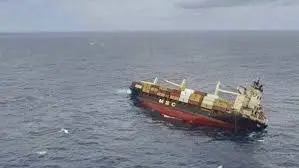Failure in ship’s ballast water management system could have caused mishap off Kerala coast

Kerala, May 29, 2025 — A recent maritime incident near the Kerala coast has raised alarm among marine safety authorities and environmentalists. Preliminary investigations point to a failure in the ship’s ballast water management system as the cause. The cargo vessel lost stability and nearly ran aground on May 27. Fortunately, no crew members suffered injuries, and the vessel avoided major damage.
How the Incident Unfolded
The cargo ship sailed along India’s southwestern coast when it suddenly became unstable near Kerala’s shoreline. The crew struggled to maintain control as the ship drifted toward the shore and struck submerged rocks. After the collision, the ship regained balance and moved away from the danger zone.
Officials suspect the ballast water system malfunctioned and caused the imbalance. This system helps maintain a ship’s stability by adjusting water weight inside dedicated tanks. When ballast water management fails, the vessel becomes prone to listing or drifting off course.
What Is Ballast Water Management?
Ballast water keeps ships stable and safe during voyages. When ships carry less cargo, they take in seawater into ballast tanks to maintain proper balance. The system controls water levels depending on cargo weight and sea conditions.
The International Maritime Organization (IMO) regulates ballast water under its Ballast Water Management Convention. Ships must treat or exchange ballast water to stop the spread of invasive marine species. India adopted these regulations in 2017 to protect local marine life and ensure safe shipping.
Possible Reasons for Failure
Investigators are looking at several causes for the ballast water system’s failure:
- Mechanical faults in pumps or valves.
- Crew errors in handling or monitoring ballast operations.
- Outdated or poorly maintained equipment.
- Insufficient crew training on ballast water protocols.
Captain Rajesh Menon, a maritime safety expert from Kochi, said, “Ballast water management plays a critical role in maritime safety. Proper maintenance and crew training can prevent such incidents.”
Safety and Environmental Risks
When ships mismanage ballast water, they risk capsizing or drifting dangerously. The Kerala incident shows how quickly a vessel can lose control. Besides safety risks, ballast water discharge threatens marine ecosystems. It can introduce invasive species that harm local fisheries and biodiversity.
Kerala’s coastal waters host rich marine life that supports fishing communities. Any disruption caused by invasive species affects their livelihoods and local economies.
Authorities Take Swift Action
The Kerala Maritime Safety Authority (KMSA) immediately ordered a detailed inspection of the ship’s ballast water system. They want to identify the exact cause and prevent future mishaps. The Indian Coast Guard has increased coastal surveillance and is ensuring all ships follow ballast water rules.
Ships must comply with IMO standards and India’s Environment Protection Act. Authorities warn that failure to do so will attract strict penalties.
Strengthening Ballast Water Controls
Experts stress the need for stronger enforcement of ballast water regulations. Many vessels still use outdated systems that fail to meet international standards. “Technology like ultraviolet treatment and electrochlorination shows promise,” said marine biologist Dr. Anjali Nair. “But enforcement and crew competence must improve alongside technology.”
Impact on Local Communities
Fishing communities along the Kerala coast depend on a healthy sea for their income. “If pollution or accidents increase, our fish catch will suffer,” said fisherman Suresh Kumar from Alappuzha. The recent incident, though minor, reminds us how crucial safe shipping practices are for coastal livelihoods.
Moving Forward
The Kerala incident highlights the need for regular maintenance, better crew training, and advanced ballast water technologies. Authorities and ship owners must work together to protect maritime safety and the environment.
Regular inspections and strict monitoring will help reduce risks. Engaging coastal communities in awareness programs can also improve cooperation.
Conclusion
The ballast water system failure that caused the mishap off Kerala’s coast reveals the link between ship safety and environmental protection. As shipping traffic grows, India must enforce high ballast water standards. This will help prevent accidents and safeguard marine ecosystems vital to local communities.
Maritime authorities in Kerala remain committed to preventing such incidents and ensuring safer seas for all.






